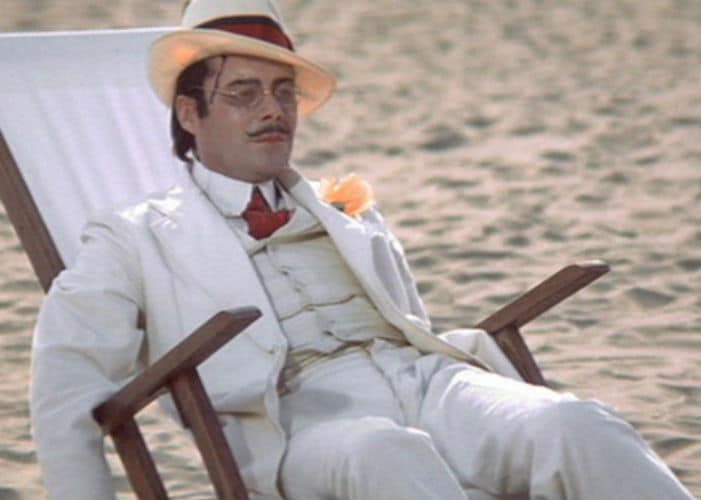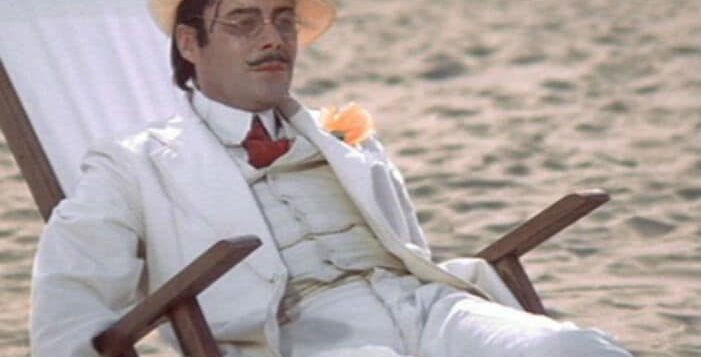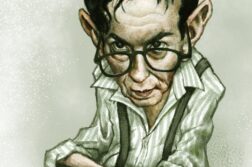DIRK BOGARDE (1921–1999) was a British film actor of the postwar era who was a major star in Europe and even made inroads into the American dream machine. His first Hollywood film was the underwhelming Song without End: The Story of Franz Liszt (1960). The film’s director dropped dead of a heart attack during production, and the final release flopped. Bogarde went back to Europe and never again attempted to court Hollywood, whose obsession with money and profit he found a fatal turn-off. Also, he found the Continent more congenial to his lifestyle as a gay man at a time when homosexuality was illegal in the UK and could get you blacklisted in Hollywood.
At that time—the late 1950s and early ’60s—sleaze was starting to sell, and gay rumors were finding their way into print in the ever-expanding tabloid press. Certainly the Anglo-American media would have wasted no time blowing the cover on Bogarde and his relationship with live-in “manager” Tony Forwood, with whom he would live until his death in 1988. In 1968, Bogarde and Tony set up house in a rural village in the South of France, where they were safe from the media glare, in a country free of the Protestant prejudices Bogarde so vocally loathed.
Bogarde had been an intelligence agent during World War II, and was present at the liberation of Bergen-Belsen. Upon returning to England after the war, Bogarde set about getting his acting act together and appeared in a string of rather banal comedies that, for whatever they lacked in substance, made Bogarde one of the biggest stars in England. He was said to be “the Idol of the Odeons,” and developed a huge following of young female fans and, one suspects, a few male ones, too.
Throughout the 1950s, Bogarde remained Britain’s top heartthrob. From 1953 to 1959, he was one of the highest-earning box office stars in England, and for those six years, he was never out of the top five (he was number One in 1955 and ’57). He treated his fame as something of a joke, and refused to court his growing image as Britain’s Rock Hudson. In 1961, he starred in the decidedly queer Western The Singer Not the Song. The film finds our hero (or antihero) stalking the sun-blanched streets of a Spanish village in crotch-hugging leather pants and a gambler hat, a gun in one hand and a riding crop in the other. The bandit Anacleto, Bogarde’s character, keeps the whole town in fear of his riding crop and caustic zingers. He meets his match in the village priest, played by John Mills, who delivers a performance that, to call it wooden, would be an insult to trees (to borrow from Joan Collins).
The film isn’t great, but what it lacks in verve it makes up for in camp. One of my favorite scenes in movie history is Bogarde attending a church service in his leather pants without a hint of shame. In another scene he holds a white cat, which he gently, contemplatively strokes, his hands encased in black elbow gloves. Bogarde fumes. Pussy purrs. According to sources, Bogarde’s quasi-comical treatment of the role was his revenge for John Mills being cast as the priest. He’d promised the studio that if John Mills were chosen he would make life miserable for everyone involved. Mills was cast, Bogarde stewed, and the film bombed at the box office, though it is still one of the most unusual movies ever made, and one of the first to be so overtly homosexual. The film’s director Roy Ward Baker later reported that the black leather pants were Bogarde’s idea. At the very least Bogarde must be given some credit for his bravery, taking a role that he must have known would not help his career.
Bogarde’s reputation as a matinee idol was effectively finished off later that year when he starred in Joseph Losey’s gay thriller Victim, in which Bogarde plays a respected, married London lawyer who’s living a double life. In the climactic confrontation scene, Bogarde’s character, Melville Farr, admits to his wife, played by Sylvia Syms, that he has been ensnared in a blackmail scandal, and that he has, in fact, had a sexual encounter with a young man. “I wanted him!” Farr shouts as his spouse looks on in horror.

Victim, filmed in just ten days, fared well at the box office, considering its subject matter. It was arguably the first film in English to deal with and name homosexuality as a topic, and the first to treat it in a largely respectful, sympathetic way. The film’s dialogue expressly calls out the continuing gay criminalization laws in Britain as enabling blackmail, and it is widely credited with boosting the passage of the Sexual Offences Act 1967, which finally decriminalized homosexuality in Britain.
Bogarde’s fall from the marquee was complete: The Singer Not the Song and Victim had been a coming out of sorts, a virtual one-two punch, and never again was he as popular with the British public as he had once been. Meanwhile, Bogarde continued to star in films with gay characters and gay directors throughout the ’60s and ’70s, notably with Luchino Visconti and with Werner Fassbinder. His collaboration with Visconti on Death in Venice (1971)—Bogarde’s last major contribution to cinema—resulted in what is often seen as his finest performance as an actor, a feat doubtless aided by Visconti’s majestic direction.
After that, Bogarde had a second career as a very popular novelist and memoirist. In one of his memoirs, he explains that Visconti had not given him a script for the film; he had merely tossed Mann’s novella at him and told him to read it. Then he told Bogarde to go out and get all of Mahler’s records and listen to them. Only then he would get it. Bogarde also reveals Visconti’s fascinating tale of how Thomas Mann’s story had come into being. He says Visconti told him that Mann had encountered Mahler on a train from Venice to Munich. Mahler, who appeared to be in quite a state, told him of the shattering episode he’d just experienced in Venice: an encounter with youth and death. Mann wrote up the story.
I couldn’t help but think of the creative strand that ran through these individuals going back nearly a century: Mahler-Mann-Visconti-Bogarde. Four men who were probably all gay to some extent, from four different generations and fields of creativity, achieving a synthesis across time, to make this beautiful work of art.
Erik Lewis is a writer, voyager, and interviewer whose blog is at thesatires.com.





